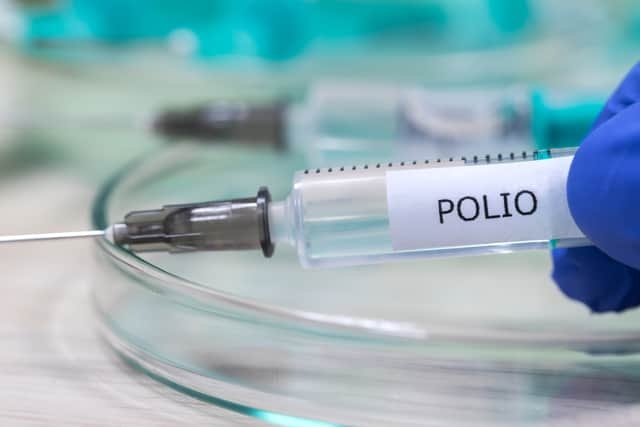How is polio transmitted? How does virus spread, how contagious is it - and London vaccine rollout explained
and live on Freeview channel 276
Children aged one to nine in London will be offered an extra polio vaccine, as traces of the virus were found in the city’s sewage.
But how is polio transmitted between people?


Here’s what you need to know.
What is polio?
Polio is a serious infection, but is now very rare because of the vaccination programme.
Advertisement
Hide AdAdvertisement
Hide AdIt’s only found in a few countries and the chance of getting it in the UK is extremely low.
However, the virus has recently been found in sewage in the London areas of Barnet, Brent, Camden, Enfield, Hackney, Haringey, Islington, and Waltham Forest.
The virus has also been found in lower concentrations in areas adjacent to the Beckton catchment area to the south - which is immediately below the Thames - and to the east of Beckton.
It is not clear whether the virus has established itself in these areas or if the detections are due to people from the affected area visiting these neighbouring areas.
Advertisement
Hide AdAdvertisement
Hide AdThe Joint Committee on Vaccination and Immunisation (JCVI) said there have been no confirmed cases of polio and that the risk to the public is low.
This comes after the UK Health Security Agency (UKHSA) declared a national incident in June after traces of the virus were found during routine surveillance at the Beckton Sewage Treatment Works, which serves around four million people in north and east London.
How is polio transmitted?
Polio is caused by a virus that spreads easily from person to person.
It usually spreads through contact with the poo of an infected person, for example, from not washing your hands properly and putting them in your mouth, or from contaminated food or water.
Advertisement
Hide AdAdvertisement
Hide AdIt can also spread through coughs or sneezes, but this is less common.
The NHS says your chance of getting polio in the UK is extremely low because most people are fully vaccinated, with polio eradicated in Europe in 2003.
There is an extremely small risk of catching it when travelling in a country where polio is still found, such as Afghanistan and Pakistan.
However, if you’re not vaccinated, there is also a very small risk of getting it through contact with a person bringing the polio virus from these countries when they return to the UK.
Who can get a polio booster?
Advertisement
Hide AdAdvertisement
Hide AdChildren aged one to nine in London are to be offered a polio booster vaccination.
The NHS will contact parents when it is their child’s turn to come forward for a booster or catch-up polio dose.
It will start in areas where the virus has been detected and where vaccination rates are low, followed by a rapid rollout across the rest of the London boroughs.
The vaccine uptake in London is already lower than in the rest of the country - at 90% having the correct number of vaccines, compared to 95% nationally.
Comment Guidelines
National World encourages reader discussion on our stories. User feedback, insights and back-and-forth exchanges add a rich layer of context to reporting. Please review our Community Guidelines before commenting.
